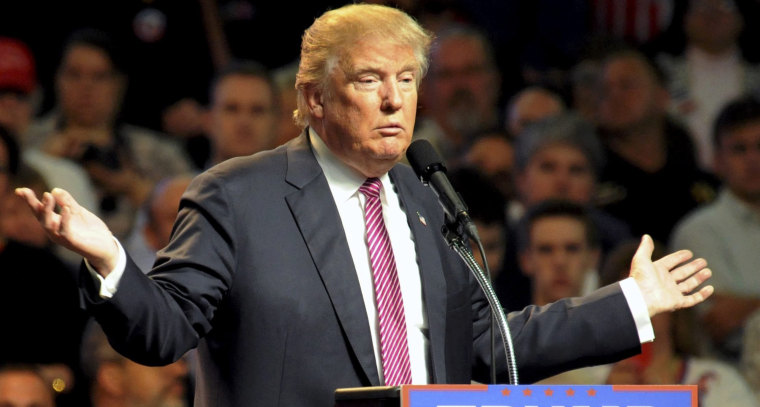First Read is a morning briefing from Meet the Press and the NBC Political Unit on the day's most important political stories and why they matter.
Will Trump be a down-ballot drag for Republican candidates?
Last week, Politico obtained an audio recording of this remark from John McCain (R-AZ) at a fundraiser in April: “If Donald Trump is at the top of the ticket, here in Arizona, with over 30 percent of the vote being the Hispanic vote, no doubt that this may be the race of my life.”
Well, he isn’t alone.
As Republicans are divided about Trump at the top of the ticket, another question they’re facing is down the ballot: Will Trump be a drag on the other Republicans who are running? Already, we’ve seen these TV and digital ads in Arkansas, Arizona, and New Hampshire tying Trump to the GOP senators up for re-election in these red/purple states. Per NBC’s Marianna Sotomayor and Frank Thorp, 12 of the 21 GOP senators up for re-election this year are supporting Trump -- up from eight when they previously surveyed these senators (before Trump wrapped up the GOP nomination).
But that is still just about half of all GOP senators on the ballot in November. Maybe the political environment improves for Republicans. And maybe today’s divisions over Trump seem like a distant memory. But as things stand right now, many GOP politicians -- even those who thought they were in safe seats -- might be in the races of their lives.
Why Bernie Sanders is likely to beat Hillary Clinton in West Virginia
In May of 2008, Hillary Clinton crushed Barack Obama in West Virginia’s Democratic primary, 67%-28%, even when it was pretty clear Obama would be the party’s presidential nominee. Eight years later, it’s likely that Clinton will suffer the same fate tonight in West Virginia that Obama did. Why? As we’ve come to learn, Clinton’s performance in these white working-class states back in 2008 was LESS about her and MORE about views about the front-runner -- Obama. And so if Sanders runs up the score tonight in West Virginia, it might be less about him and his views on democratic socialism and more about the woman who has embraced 98% of Obama’s agenda, especially on energy and coal.
One other reminder about the West Virginia primary: In 2012, a felon serving a 17 ½ year sentence got 41% of the vote against Obama in the state’s Democratic primary -- when the Democratic president was essentially running unopposed. “Simply put, West Virginia does not like Obama,” the Washington Post wrote at the time. Polls close in West Virginia at 7:30 pm ET, and 29 pledged delegates are up for grabs on the Dem side. Nebraska is also holding its presidential primary on the GOP side, but there’s no Republican remaining in the race besides Trump. Here’s the delegate math in the Democratic contest:
In pledged delegates, Clinton currently holds a lead of 282 delegates
- Clinton 1,704 (55%)
- Sanders 1,419 (45%)
Clinton must win 35% of remaining pledged delegates to get a majority in pledged delegates
Sanders must win 65% of remaining pledged delegates to get a majority in pledged delegates
In overall delegates (pledged + super), Clinton holds an overall lead of 766 delegates

Clinton must win 15% of remaining delegates to reach 2,383 magic number
Sanders must win 85% of remaining delegates to reach 2,383 magic number
NBC|SurveyMonkey tracking poll: Clinton leads Trump by 5 pts nationally:
In this week’s online NBC|SurveyMonkey tracking poll, Hillary Clinton holds a five-point national lead over Donald Trump, 49%-44%. Meanwhile, a trio of swing state Quinnipiac polls show tight races in Florida (Clinton 43%, Trump 42%), Ohio (Trump 43%, Clinton 39%), and Pennsylvania (Clinton 43%, Trump 42%). But the polling samples in those three states are whiter than what they were in 2012, according to the exit polls.
- Quinnipiac’s Florida sample is 69% white -- was 67% in 2012;
- Quinnipiac’s Ohio sample is 83% white -- was 79% in 2012;
- Quinnipiac’s Pennsylvania sample is 81% white -- was 78% in 2012.
Source: Clinton camp will advertise in Kentucky
A Democratic source familiar with the Clinton campaign tells NBC’s Kristen Welker that the campaign has reserved ad time in Kentucky for later this week. This is noteworthy because the campaign did not advertise in Indiana or West Virginia. A campaign aide told Welker that they think Kentucky will be close, but think they have a shot at winning because it is a closed primary (meaning independents can't vote). They are bracing for losses in West Virginia and Oregon. Additionally, Welker reports that Clinton will announce a new child care policy in Kentucky today. This is the type of initiative aimed at appealing to women and working class voters who are critical to her general election strategy.
On the trail
Hillary Clinton campaigns in Kentucky… And Bernie Sanders hits both California and Oregon.



